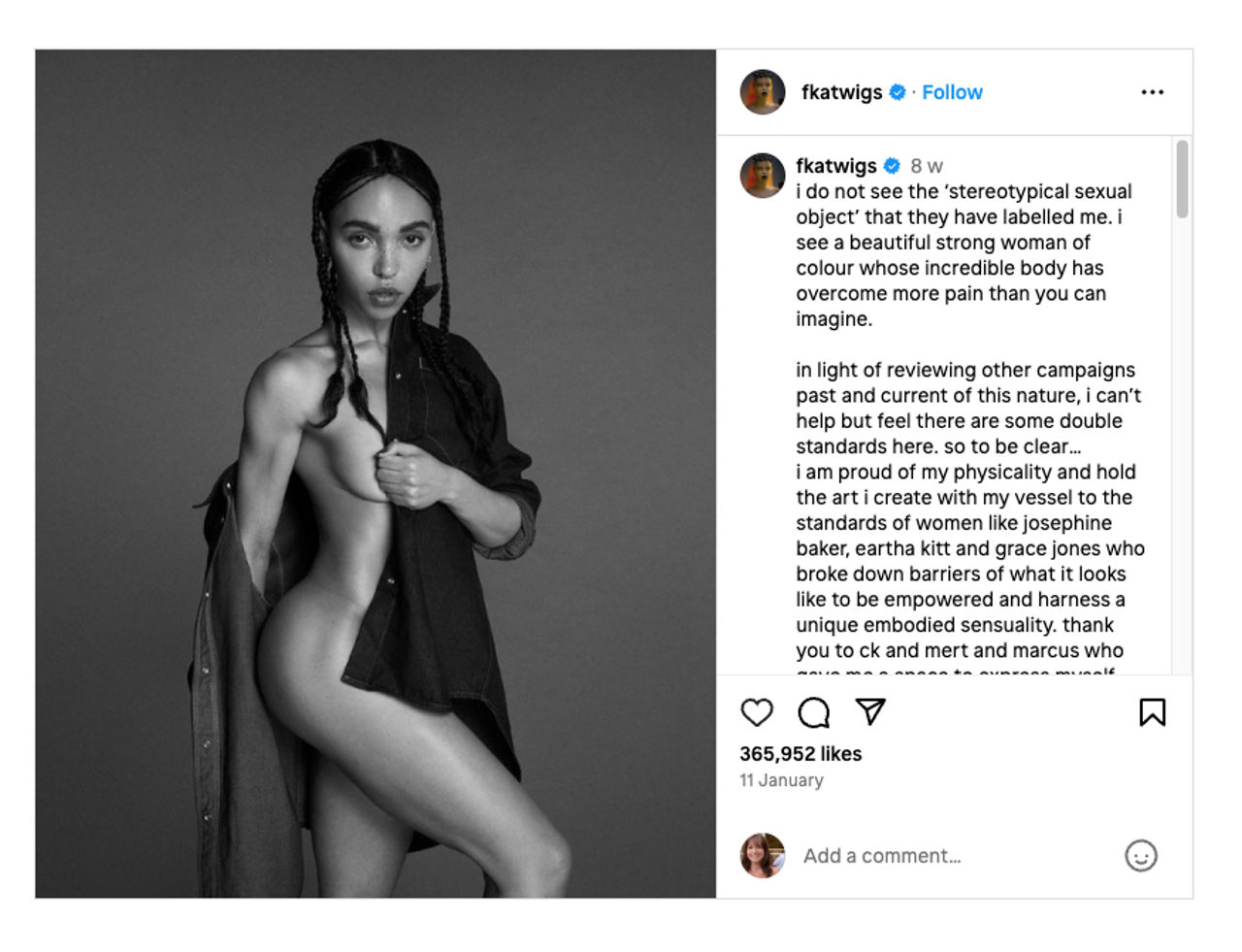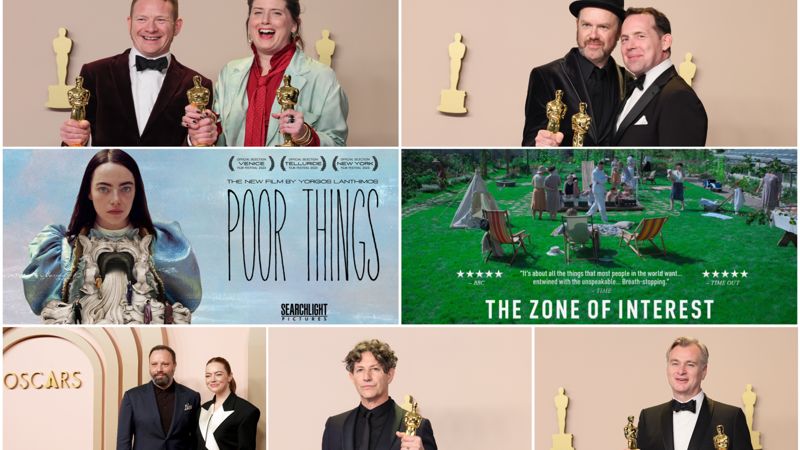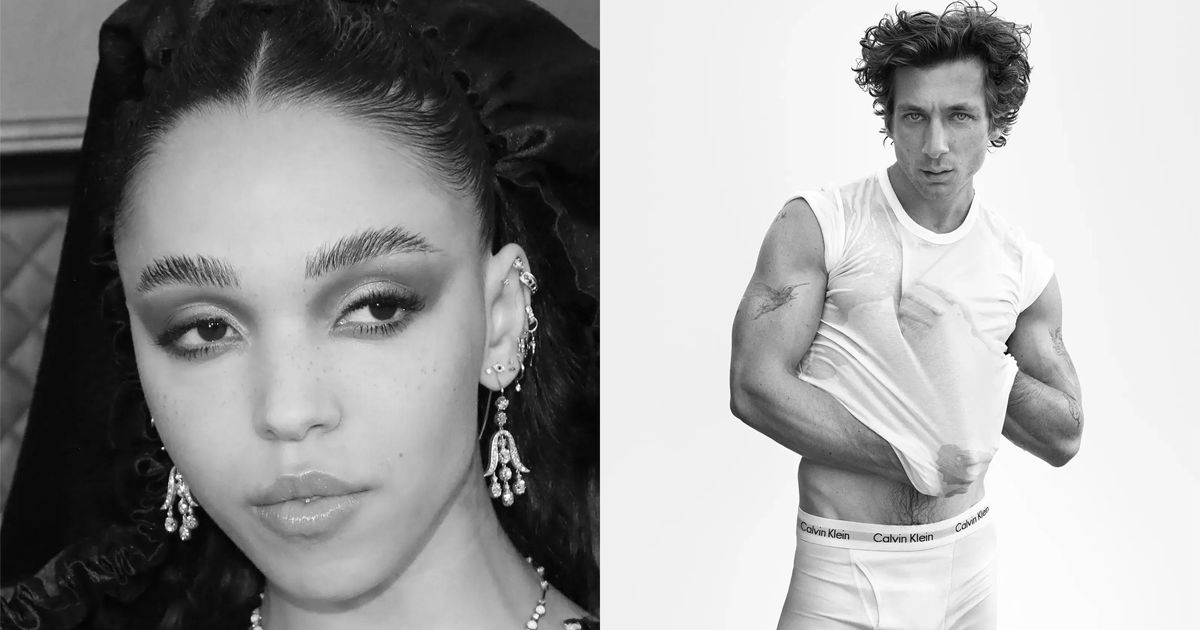The belle and The Bear: what the ASA's CK U-turn says about objectification
The ASA's ban of FKA twigs' Calvin Klein campaign, because it objectified her as "sex object", was criticised by the singer and by others who noted that The Bear's Jeremy Allen White escaped regulation for a far saucier ad. Kirsty Hathaway, ECD at JOAN, comments on this reversal and wonders if International Women’s Day played a part.
The ASA is on a metaphorical road to nowhere. It thought it was in safe territory when it banned Calvin Klein’s poster ad featuring FKA twigs on the grounds that it presented her as a ‘stereotypical sexual object’.
Cue the tantalising diversion of Calvin Klein’s alternative advertising universe – courtesy of Jeremy Allen White in his tighty-whities remaining unbanned – and the entirely obvious hypocrisy of the ASA’s original decision, which has meant it has now been forced to make a U-turn.
Despite the FKA twigs campaign receiving complaints when it first launched in April 2023, it wasn’t banned by the ASA until January this year...
The ASA’s latest statement proclaimed: “After careful thought, the image was not sexually explicit and the ad presented FKA twigs as confident and in control and, therefore, she had not been objectified”. Quite literally the opposite of the statement it first put out.
But this isn’t even the most painful part. Despite the FKA twigs campaign receiving complaints when it first launched in April 2023, it wasn’t banned by the ASA until January this year – almost exactly the same time Jeremy Allen White’s campaign launched. What’s more baffling, two images from the same Calvin Klein campaign featuring model Kendall Jenner were not banned despite similar complaints.

Above: Responding to the initial ASA ban, FKA twigs said she saw "a beautiful strong woman of colour" rather than an object.
Is it just me, or are we all confused about the ASA’s protocols? And as Allen White's pulse-raising campaign garnered much attention (there were certainly some ‘choice’ phrases shared on my school mum’s WhatsApp group), it stayed firmly out of the ASAs clutches – seemingly avoiding the same scrutiny. Double standards? I think so.
Following her ad’s ban, FKA twigs quite rightly took to social media to speak out against the ASA’s decision. She spoke about her strength and referenced other women who broke down societal barriers around empowerment, including Josephine Baker, Eartha Kitt and Grace Jones. Sparking public outcry, there’s no doubt FKA twig’s post played a part in the ASA’s dramatic U-turn.
However, there is more to this than meets the eye (or mind). Allen White’s ad was laced with comedy and humour. Playing on the male gaze, its marketers knew exactly what they were doing. The campaign was created to spark conversations in the industry and beyond. Calvin Klein played a risky hand with the ASA, but the campaign went viral, generating $12.7 million in media exposure for the company in just 48 hours, and led to the widespread debate of Allen White vs FKA twigs. It was a clever move by Calvin Klein.
If the ASA was a brand, we’d quickly come to the conclusion the U-turn and timing was all part of a bigger publicity plan.
But what has so far been overlooked is whether the ASA’s decision was in any way influenced by International Women’s Day – given its announcement landed just two days before the world celebrates women’s equality. If the ASA was a brand, we’d quickly come to the conclusion the U-turn and timing was all part of a bigger publicity plan.
Credits
powered by
- Agency Client Direct
- Production Company January
- Director Mert Alas
-
-
Unlock full credits and more with a Source + shots membership.
Credits
powered by
- Agency Client Direct
- Production Company January
- Director Mert Alas
- Color Coffee & TV
- Color Producer Pete Burch
- Colorist Simona Cristea
- Talent Jeremy Allen White
- DP Dariusz Wolski | (DP)
- Stylist Emmanuelle Alt

Credits
powered by
- Agency Client Direct
- Production Company January
- Director Mert Alas
- Color Coffee & TV
- Color Producer Pete Burch
- Colorist Simona Cristea
- Talent Jeremy Allen White
- DP Dariusz Wolski | (DP)
- Stylist Emmanuelle Alt
Above: Calvin Klein's risky risqué campaign with Jeremy Allen White paid off – generating $12.7 million in media exposure in just 48 hours.
Its U-turn could also be seen as a bid to regain credibility and trust among brands and consumers following a period of backlash. But, beyond the female vs male nudity debate around one brand’s latest campaign – and a brand that has built its creative reputation by using naked bodies to highlight its apparel – what does this mean for brands, advertising and creative going forward?
Is there one rule for men’s bodies and another for women’s in advertising?
The hypocrisy – from the ASA and consumers – leaves brands in a quandary. Is there one rule for men’s bodies and another for women’s in advertising? Has the ASA’s U-turn made things clearer for brands, or less so? It makes the boundaries in advertising creativity all the more complex.
Following the pandemic, we witnessed more brands tap into a newfound freedom of expression and sensuality, as consumers relished once again physical gatherings and communications. The use of sex and sexuality in ads changed, emphasising individuals’ emotional connections and feelings. It heralded a new display of female sexuality. One of empowerment, confidence and self-love rather than objectification and disdain. The challenge for advertisers now is to find that delicate balance of joyful intimacy to ignite customers’ interest while navigating the mood of the regulatory powers at that time.
If this ASA ruling has taught brands anything, it's to stick to your messaging, believe in your creativity and stand your ground.
)




 + membership
+ membership







